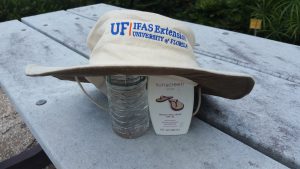Article and audio introduction by Samantha Kennedy, Family and Consumer Sciences
An abundance of sunshine is one of the many reasons why so many people love Florida. In fact, it is why we are known as “The Sunshine State.” However, while the sunny days provide tons of opportunities to enjoy the great outdoors, too much sun exposure can lead to minor injury, serious illness, or even death. Practicing a few UV safety tips can help you stay safe this summer.
The harsh UV rays from the sun can begin to damage the skin in as little as 15 minutes. In fact, even if the skin is not outwardly burned, it may be damaged underneath. Continued unprotected short-term exposure adds up over time, leading to more serious skin damage such as melanoma.

Adopting a few sun safety practices greatly reduces the risk of serious skin damage. One simple practice is the daily application of sunscreen, even on cloudy days, as UV rays can penetrate cloud cover. A minimum Sun Protection Factor (SPF) of 30 is recommended for exposed skin, including lips. Do not use sunscreen past its expiration date, as it may not be as effective. (Check out our blog article “Sunscreen Made Simple” to learn more about sunscreen.)
Eyes should be protected as well, as prolonged exposure to the sun can lead to vision loss or even blindness. Sunglasses which protect against both UVA and UVB rays offer the best protection. Wraparound sunglasses offer the most comprehensive protection of both the eyes and the tender skin surrounding them.
Cover other exposed skin as much as possible with dry, loose-fitting clothing whenever possible, on top of wearing sunscreen. Reapply sunscreen every two hours, especially during continuous sun exposure and after swimming, sweating, and toweling off.
Children under one year of age should be kept out of the sun as much as possible. Keep babies in the shade of a tree, umbrella, or stroller canopy at all times. Older children should follow the same precautions as those given above. Keep in mind, very young children cannot state it is too bright or too hot, so be extra vigilant.
Staying cool and hydrated is also important during those hot summer days. Even those who are acclimated to the climate can easily fall into the dangerous trap of dehydration and overheating. Paying attention to the body’s needs will help prevent heat stress and more serious heat-related illness.
The sun is at its hottest and most brutal between the hours of 10 a.m. and 4 p.m. Reducing outdoor activities between these hours can help reduce the risk of overheating. If this is impossible, be sure to take frequent breaks in a cool, shady spot to help maintain proper body temperature.
Lightweight, light-colored clothing reflects heat better than heavier, darker colors. Hats with wide brims going all the way around are ideal and offer more protection to the ears, neck, and scalp. Baseball caps are fine, but be sure to use a cloth in the back that drapes over exposed skin for more protection.
Drink plenty of fluids constantly. Plain water is the best choice to maintain proper hydration. Avoid alcohol, caffeine, and high amounts of sugar, as these can promote water loss, leading to dehydration. Find a shady spot or an air conditioned space to retreat to periodically throughout the day to keep from overheating.
Some symptoms of heat exhaustion include excessive sweating, confusion, dizziness, weakness, and nausea. Seek shade or air conditioning immediately.
Anyone experiencing an elevated body temperature, hot and dry skin, continued nausea or vomiting, and/or loss of consciousness may be suffering from heat stroke or other severe heat-related illness. Seek medical attention right away.
Florida’s sunshine draws millions of visitors a year. But for visitors and residents alike, it can be dangerous without the proper precautions. By being sun smart, the dog days of Florida’s summer will not take a bite out of the fun.
Resources:
Be Safe in the Sun (American Cancer Society)
Sun Safety (Centers for Disease Control and Prevention)
UF/IFAS is an Equal Opportunity Institution.
 0
0
